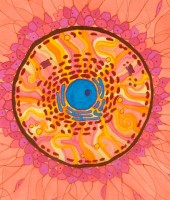Twilight Bioethics: Reproduction and Technology
Series of three conferences organised by the CIUP's Club des chercheurs, with Benjamin Hegarty, Senior Research Associate in medical anthropology at the UNSW Sydney, Research Affiliate at Oxford University, and 2024-2025 research-fellow at the Paris IAS (FIAS program), and Anne Le Goff, philosopher, researcher at the forefront of science and technology studies and bioethics based at the Institut SupBiotech in Paris and 2024-2025 research-fellow at the Paris IAS (FIAS program).

Open to the public with mandatory registration (see details below). Event onsite and online.
Presentations will be given in English and questions will be welcome either in English or French.
The sessions will be followed by receptions with drinks.
Presentation
What if humans could reproduce using lab-made gametes and grow their babies in artificial wombs? What are the ethical lessons of changing technologies related to existing practices, like human milk banks?
The Twilight Bioethics series brings together interdisciplinary contemporary questions of how scientific and medical technology is reconfiguring boundaries between life and death, the body and personhood, some of which are anticipated in science fiction. The focus of the series will be on the “ethics of life,” concerned specifically with processes of reproduction and life-creating or -sustaining techniques at the earliest stages of development.
The development of such biotechnologies requires attention to their ethical implications from a broad range of perspectives. The series hopes to stimulate discussion between scholars, scientists, and practitioners from a broad range of disciplines to consider the meaning and potential impacts of these technologies on human and animal life. These cross-cutting themes will be considered through a focus on three current technologies that are at different stages of research and introduction, namely human milk banks, in vitro gametogenesis, and artificial wombs or ectogenesis.
Scientific committee:
Benjamin Hegarty, UNSW Sydney, Paris IAS
Anne Le Goff, Institut Sup'Biotech, Paris IAS
Jack Turley, CIUP
Bertrand Cosson, Paris Cité University, CIUP
Program
Human Milk Banking - 5 February 2025 (6pm-9pm)
With Mathilde Cohen (Paris IAS), Benjamin Hegarty (Paris IAS) and Cécile Vermot (SupBiotech Institute)
Human milk is the only human substance specifically used as a food for infants, and rests on specifically gendered practices generally associated with women. In contemporary France and several other countries, donated human milk is distributed via human milk banks. Bioethicists have focused on donated human milk in terms of the necessity of regulating it as a tissue, usually compared to blood donation, for the reasons that it can harbour risky pathogens. However, historically, human milk has held different cultural, social, legal, and medical meanings, including as food and as an economic resource. This session will consider different perspectives from law and social sciences regarding the regulation of human milk, whether as ‘tissue,’ food, or something else, with a particular focus on the implications for mothers and gendered social understandings of human milk as a multifaceted substance in different settings.
Information and registration - February 5
Making Gametes In Vitro - 20 March 2025 (6pm-9pm)
With Anne Le Goff (Paris IAS, CIUP), Gabriel Livera (Université Paris Cité, CEA) and Noémie Merleau-Ponty (CNRS, IRIS)
Stem cell research has opened up a whole new world of hope for regenerative medicine. One of its most striking applications is the possibility of producing eggs and spermatozoids from stem cells, and potentially using them for human reproduction. This is the emerging field of in vitro gametogenesis (IVG). By making the production of gametes independent of the body, IVG could fundamentally transform the way in which humans and animals reproduce. This discussion will address the major ethical and social issues raised by this advance, drawing on current research in the field. We will examine the prospects that this work offers for human reproduction, as well as the issues that need to be taken into account if these advances are to develop in a fair and responsible manner.
Information and registration - March 20
Ectogestation (Artificial Wombs) - 10 April 2025 (6pm-9pm)
No longer found only in the realm of science fiction, methods of artificial womb technology (ectogestation) are currently under development and are being tested in animal models. It is likely that human trials will take place within the next decade. The appearance of this technology on the horizon has raised significant ethical and social concerns. Many of these concerns are around areas of life which are already a source of significant disagreement, including: reproductive choices, the moral status of the fetus and newborn infant, care for extremely preterm infants and conceptions of personhood and parenthood. In the future, artificial womb technology may change the way that life starts for some people. Thinking about how it might work may also help us to better understand some difficult questions of definitions and norms around reproduction and the beginnings of life that we face today.
|
|
|
Symbiotic viruses: More-than-human anthropology, queer theory, and virology 01 September 2024 - 30 June 2025 Same biotechnology, different challenges: Global ethics of in vitro gametogenesis 01 September 2024 - 30 June 2025 |
|
|


